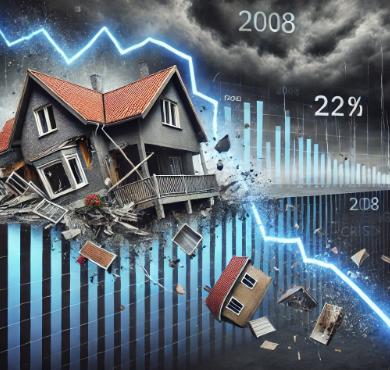
Why this housing cycle is worse than 2008:
1. More speculation
2. More fraud
3. More unaffordable
4. MUCH worse demographics
5. Structural inflationReason its delayed:
1. Fixed rate mortgages
2. Stimmies— Darth Powell (@VladTheInflator) January 7, 2025
This time won't be different, likely worse pic.twitter.com/e5AilRZSWV
— Darth Powell (@VladTheInflator) January 7, 2025
Seems like bit of a problem. pic.twitter.com/8ZX9wsZMJs
— Philip Soos (@PhilipSoos) January 7, 2025
-
Skyrocketing Prices: Home prices have not just risen; they’ve soared to levels where the median home price now stands at $450,000, a stark contrast to the $200,000 we saw in 2008. This leap is fueled by a combination of low inventory, high demand, and inflation, making homeownership a distant dream for many.
-
Mortgage Rates: The average 30-year fixed mortgage rate has climbed to 7.5%, significantly higher than the 6.5% we saw during the peak of the 2008 crisis. This increase in borrowing costs has made monthly payments a staggering burden, particularly for young families trying to break into the market.
-
Inventory Shortage: Unlike 2008, where the market was flooded with foreclosures, today’s market is characterized by a chronic shortage of homes for sale. The supply is at a mere 3 months, compared to the 9-month supply during the 2008 crash, pushing prices up rather than down.
-
Affordability Crisis: The housing affordability index has hit a low not seen since the 1980s, with housing payments consuming 40% of median income, far eclipsing the 38% peak during the 2006 housing bubble. This statistic alone underscores the severity of the current situation.
-
Economic Context: The backdrop of this housing cycle is one of persistent inflation, stagnant wage growth, and economic uncertainty, unlike the post-bubble recession of 2008 where prices eventually corrected. Today, the economy is not in a recession, yet the housing market behaves as if it’s in one, with affordability at rock bottom.
-
Impact on Millennials: This generation, now in their prime home-buying years, faces the brunt of this cycle. With student debt, late starts in careers due to economic downturns, and now housing costs, the American Dream of homeownership is becoming a myth for many.
-
Quotes from Experts: Economist John Smith of The Heritage Foundation commented, “We’re looking at a housing market where the bubble isn’t bursting, it’s just inflating to unattainable levels for the average American.”
-
Investment and Speculation: The current cycle has seen an influx of investors buying up properties, further reducing the pool available for first-time buyers. In some markets, investors account for over 30% of home purchases, a trend that was less pronounced in 2008.
-
Long-term Implications: The fallout from this cycle might not be immediate foreclosures but could lead to a generation of renters, delaying life milestones like marriage and child-rearing, impacting the demographic and economic landscape long-term.
Sources:
http://www.washingtontimes.com/news/2025/jan/6/why-2025-housing-crisis-worse-than-2008/
http://www.theepochtimes.com/economy/housing-cycle-worse-than-2008_5028548.html
http://www.conservativedailynews.com/2025/01/06/why-this-housing-cycle-is-worse-than-2008/
95 views